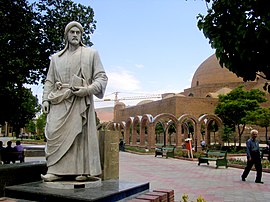Khaqani | |
|---|---|
 | |
| Native name | خاقانی |
| Born | Between 1120 and 1127 Shirvan, Shirvanshahs |
| Died | Between 1186-87 and 1199 Tabriz, Eldiguzids |
| Genre | Habsiyāt (prison poetry) |
| Notable works | Divān, Tohfat al-ʿErāqayn |
Afzal al-Dīn Badīl ibn ʿAlī ibn ʿOthmān (Persian: افضلالدّین بدیل بن علی بن عثمان), commonly known as Khāqānī (Persian: خاقانی, IPA: [xɒːɣɒːˈniː], c. 1120[i] – c. 1199), was a major Persian[ii] poet and prose-writer. He was born in Transcaucasia in the historical region known as Shirvan, where he served as an ode-writer to the Shirvanshahs. His fame most securely rests upon the qasidas collected in his Divān, and his autobiographical travelogue Tohfat al-ʿErāqayn. He is also notable for his exploration of the genre that later became known as habsiyāt ("prison poetry").
- ^ Clinton & Vil'Čevskij 1969, p. 101.
- ^ Minorsky 1945, p. 572.
- ^ a b Iranica.
- ^ Britannica.
- ^ Minorsky 1945, p. 550.
- ^ Rypka 2011.
- ^ Clinton & Vil'Čevskij 1969, p. 97.
- ^ Gould 2016.
Cite error: There are <ref group=lower-roman> tags or {{efn-lr}} templates on this page, but the references will not show without a {{reflist|group=lower-roman}} template or {{notelist-lr}} template (see the help page).